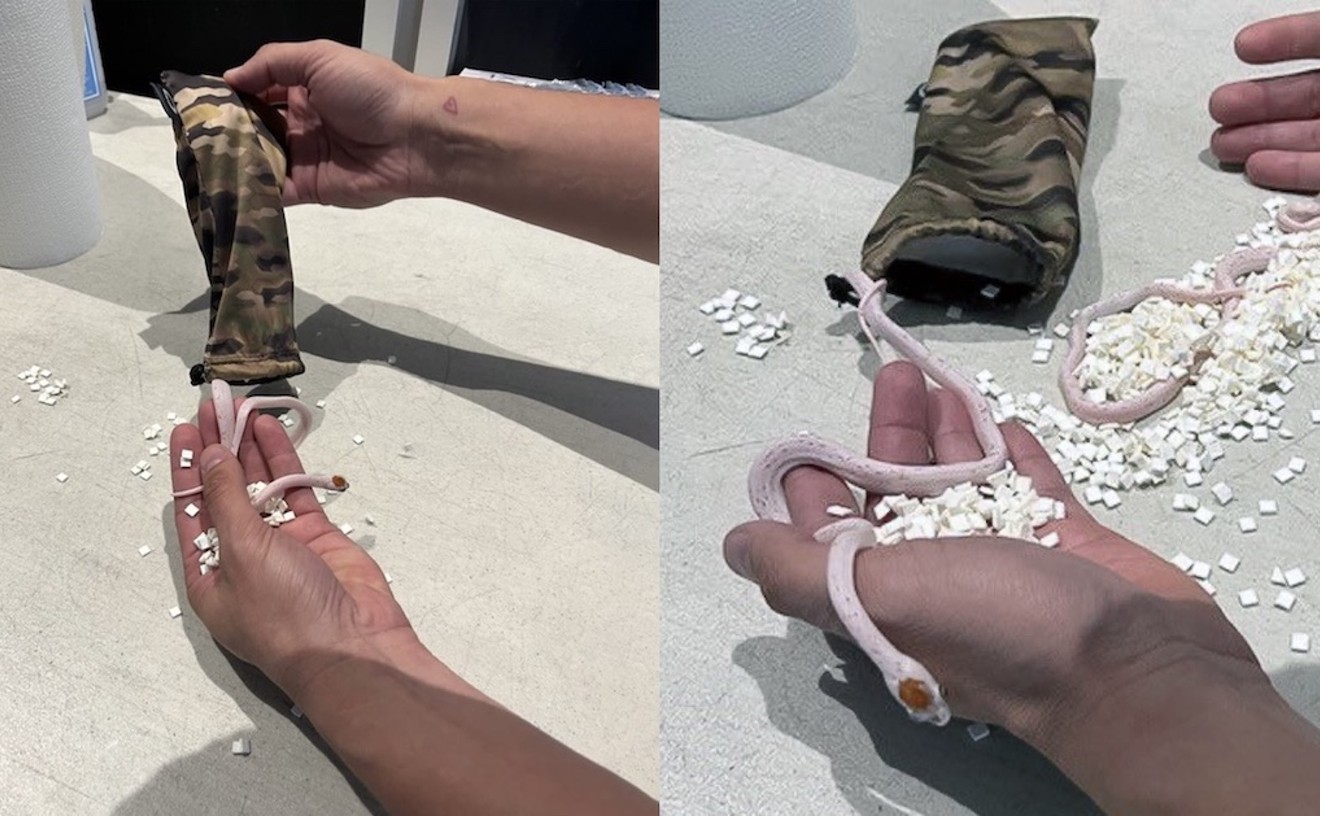For much of the past month, David Gerbier hasn't left his shabby home in a Port-au-Prince slum. A hernia has left him nearly paralyzed with pain, but he is too poor to see a doctor and can scrape together only enough money to buy over-the-counter medication.
Once a large, muscular man, the 37-year-old — who lived most of his life in Miami and Philadelphia — has become a thin, sinewy version of his former self. He sometimes goes days without food, and his only source of water is a trash-strewn ravine behind his home.
He hasn't seen his two children for years. "The hardest part of this is my kids have grown up without me," Gerbier says. Though David and Samone are teenagers, Gerbier last spent time with them when they were 8 and 3 years old. "My daughter has talked to me, but she doesn't really know her father," he says during a recent interview in the Haitian capital. "It worries me that my kids don't know me. My father wasn't there for me, and I don't want that for my kids."
Gerbier's life was forever altered a decade ago, when a drug conviction cost him his green card.
Even though a federal court tossed out the deportation order in 2002, bureaucrats at the U.S. Embassy in Port-au-Prince and elsewhere won't let him return to the States. Gerbier's case was even cited in a 2006 U.S. Supreme Court ruling that rejected the Bush administration's push to deport legal immigrants for relatively minor drug convictions.
Yet Gerbier's entreaties to return have been ignored.
"There is no system for bringing people back," says Nancy Morawetz, a at New York University School of Law professor and expert on such cases. "The Department of Homeland Security has taken the view that once a person is out of the country, it's not their problem."
It all began in 1982, when Anna Gerbier packed a suitcase, took her sons David and Jean Baptist, and boarded a flight for Miami. Hours later, David was introduced to his dad, Ferdinand. "It was the first time I met my father," David says. "I didn't really know him. He'd moved to the U.S. years earlier."
His parents struggled. Anna earned money caring for other people's kids and cleaning homes, while Ferdinand worked in an electronics factory. David tried to fit in at Allapattah Elementary School.
"There weren't too many Haitians there, and we didn't speak English," he says. "The kids would kind of say things and tease me."
At home, his parents argued. Then, just as suddenly as Ferdinand Gerbier had entered his son's life, he left.
Anna moved the family to Philadelphia, where David began having behavior problems. He was kicked out of one school and then another. His mother sent him to an all-boys school. He rebelled.
At age 18, David Gerbier became a father, though he was hardly an adult. He found work as a dishwasher at Roman Delight, a family-style restaurant on the Philadelphia outskirts, eventually becoming a cook.
He changed jobs several times, briefly lived with a girlfriend, and then moved back in with his mom. On May 1, 1996, police stopped him in Wilmington and found marijuana in the car. He pleaded guilty to possession and got three years' probation.
In June 1997, he was picked up in Wilmington for possession of 160.22 grams of crack, according to court documents. "I was coming from a friend's house, and an undercover police said he saw me stash something in a house," Gerbier says. "They didn't catch me with anything in my hand, but they said that stuff was mine."
Gerbier admits he hung out with the wrong people, and he eventually pleaded guilty to having 5 to 50 grams of coke. A judge sentenced him to five years in prison. Gerbier agreed to spend six months in a boot camp, and the sentence was later vacated.
No one mentioned immigration consequences, he says. He had a green card but hadn't filed for citizenship — which he might have been able to obtain and would have prevented future problems. Just as he prepared to leave boot camp, immigration officials swooped in. "I was packing my things up when one of the officers at the boot camp called me over to the office. He told me I had a warrant or some kind of immigration hold on me... I'd never thought about deportation."
Indeed, at an immigration hearing, Judge William P. Van Wyke found him eligible for a deportation waiver. He had a relatively clean record and children who were U.S. citizens. "I remember the immigration judge said David shouldn't be deported because he was a product of the U.S.," says David's elder brother, Gephtee Thimotee, who testified at the trial.
Government lawyers appealed the decision. Though the conviction was only a misdemeanor under federal law, it was a felony under state law. Prosecutors said he should therefore be deported. Gerbier, who couldn't afford an attorney, represented himself and filed handwritten pleadings. The Board of Immigration Appeals ordered him deported.
In December 1999, three years after being stopped on the street, he found himself in a dank, ten-by-ten-foot cell with a dozen other men in one of Port-au-Prince's most notorious jails. "There was no bed, no food, nothing," he says. "I didn't eat at first because I had no family to bring me food." For two months, he slept on the cement floor; a single window was the only source of light and ventilation. By the time he was released, his weight had dropped from 190 to 150 pounds.
He couldn't find a job and survived with help from his two brothers, who sent him $50 or $100 every month or two. "It was like Hell," he says. "I left Haiti as a kid, and I didn't remember this place. Nothing prepared me for it."
Then a Haitian radio broadcast reported a federal appeals court had tossed out his deportation case, clearing the way for him to regain his green card. Gerbier made his way to a telephone. "David called me and said the radio station was saying he could come back," Thimotee says.
Gerbier headed for the U.S. Embassy, a huge compound surrounded by soldiers and razor wire. "The person at the embassy said I needed some other paper, but no one ever told me what I needed," Gerbier says. "They would just give me the run-around and wouldn't tell me anything."
Diplomats have turned him away at least four times over the past few years, most recently in March 2008. "I tried to get a visa to go to my mother's funeral last year," he says, showing her death certificate and a copy of the visa application. "They told me to talk to a lawyer or get a letter from immigration officials saying I could come back."
A spokeswoman for the U.S. Embassy in Port-au-Prince declined to comment. Ivan Ortiz, a Homeland Security spokesman, would say only: "When appropriate, [we] will assist in the individual's return to the United States. However, our role in these cases varies on a case-by-case basis." The U.S. Department of State does not have specific rules to deal with such cases.
"You don't see a good-faith effort to bring these people back," says Marleine Bastien, executive director of Haitian Women of Miami.
"I've had to go to Haiti to help U.S. citizens come back because the U.S. government didn't believe them," Bastien says. "The U.S. officials were resistant and did not readily accept their mistakes. I know there are other people like [Gerbier]. This is a system that needs repair."
Bastien and others say such cases are even more alarming because U.S. officials recently asked the Supreme Court to expedite deportations.
At least 5,584 Haitians have been deported from the United States over the past five years, according to federal figures. Like Gerbier, many speak little or no Kreyol. And Haitian authorities lock up nearly all of them when they arrive. Deportations were briefly suspended last year, after four hurricanes cut a wide swath of death and destruction across Haiti, but they resumed this past April.
Gerbier believes the system will change. "I know that the U.S. is a place of laws," he says. "I know one day I will find justice."
This report was supported by the Justice and Journalism Fund, established by the University of California Annenberg Institute for Justice and Journalism, with Ford Foundation Funding.










